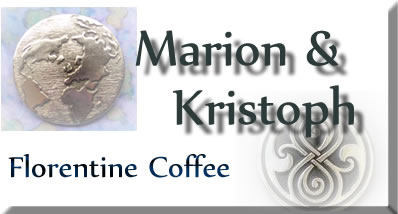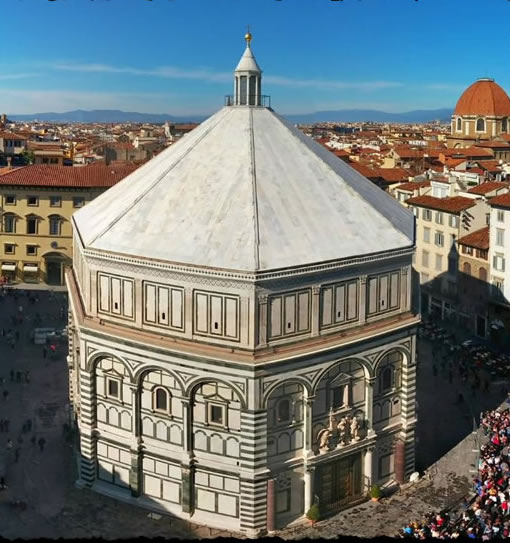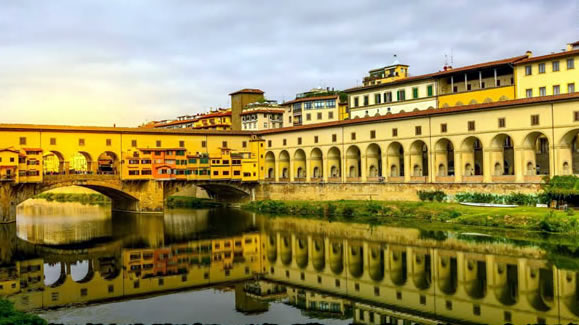

"Marion, my dear," Kristoph said with a sardonic note in his voice. "We are drinking coffee under a sunshade of a balcony café on top of the Uffizi gallery in Florence, Italy. We have an unparalleled view of some of the most admired architecture on this planet…."
He paused and glanced around at the stupendous view. Even the top of the Citadel in the middle of Gallifrey's capitol wasn't as impressive as this. From here, El Duomo, the great dome of the Santa Maria del Fiore, dominated the rooftops in its red tiled glory, defying architects down the centuries to emulate Brunelleschi's gravity defying achievement. Closer to them, directly across the Piazza Della Signoria was the Palazzo Vecchio with its off-centre clock tower. All round were glorious examples of renaissance architecture that the founders of the Capitol could not have begun to imagine.
And besides, there was no café on top of the Gallifreyan Citadel!
"So why, my dear, with wo much to admire, are you engrossed in a Google search on your tablet?"
Marion looked up from her activities and smiled as she belatedly looked around at the view.
"It's just something I've been thinking about since we were in the Piazza del Duomo, earlier. The Baptistry of Saint John…. Beautiful building. It would be the highlight of any other plaza in the world, but totally overshadowed by the cathedral."
"Yes, it is a very impressive building," Kristoph admitted. "I'm running out of superlatives to describe places in this city. Magnificent, impressive, wonderful…."
"It was something about the doors," Marion continued. "Not the tourist entrance. I mean the huge bronze doors…"
"The doors with ten splendid panels depicting stories from the Old Testament, designed by Lorenzo Ghiberti in 1402 and known as the Gates of Paradise after Michelangelo declared them to be so glorious…."
Marion said nothing in response to that. Of course, he had everything right, including the date and the correct pronunciation of Ghiberti without looking at any leaflet or guide book.
"Yes, I know the doors you mean," he added with a gentle laugh. "The grand entrance to the Panopticon used to resemble it in my grandfather's time, but they went for dark wood in recent centuries. The panels were rather different, of course."
"All the time I was looking at it, with all the tourists snapping pictures, I kept thinking I recognised the doors, not just from a guide book or a film or anything, but actually seeing them. But this is the first time we've been to Florence, and we haven't been to any of the other places listed as having copies – the Grace Cathedral in San Francisco, the Kazan Cathedral in Saint Petersburg and the Nelson-Atkins Museum of Art in Kansas City."
She definitely HAD looked up the information online. She wasn't that good.
"They sound interesting places in their own right, but we haven't been to any of them," Kristoph agreed.
"We've been to San Francisco, but for their millennium fireworks. We didn't see any cathedrals."
"You must have imagined it, then?"
"No… I figured it out," Marion said with a wry smile. "I think the writers of the website are being a bit elitist. They missed one. There is a copy of the Gates of Paradise in the Harris Library and Art Gallery, in Preston, Lancashire."
Kristoph laughed softly at the absurdity of such a thing being less than forty miles from where they had lived in Liverpool.
"I don't think we've visited there, either," he pointed out.
"No… not together. But I went there when I was at school… which isn't so long ago as it is for you. There was a special exhibition of Turner paintings going on there, including the Fighting Temeraire on loan from the National Gallery. Our headmistress insisted we all went to see it. The Harris is quite an impressive building. Lots of classical pillars and pediments on the outside. It wouldn't be out of place in any Italian Piazza, and inside there is a huge rotunda with galleris all around. There is a Foucault Pendulum demonstrating the rotation of the Earth and a copy of Lorenzo Ghiberti's Gates of Paradise."
She passed her tablet to Kristoph in confirmation of her assertion. He nodded in agreement.
"The Gates clash somewhat with the late Victorian neo-classical style of the building," he said. "But, indeed, you are quite right. And I think you must be right about the elitism of the Florentine tourism website. An industrial town in the north-west of England deserves to be recognised as much as San Francisco, St. Petersburg or Kansas City. Very remiss of them. And very well remembered, my dear."
"I was more interested in the pendulum at the time," Marion admitted. "But I certainly remember the 'Gates'. And they should be mentioned. Even Wikipedia missed it."
"Shall we forgive them long enough to do some more exploring this afternoon?" Kristoph suggested. "I've got something in mind that you'll like. It's something most ordinary tourists don't get to do, because it costs quite a bit of money. I'm buying us VIP status and I'm not telling you how much it costs because you worry about such things."
He was teasing her with mention of money. He knew she always quietly kept a note of what these trips to remarkable but expensive tourist spots cost. She never explained that she was wondering if they would be able to be so free to explore the world if Kristoph had really been the English literature professor she first took him to be. She was weighing up how much more colourful and eventful her life was with an aristocrat whose family money came from diamonds and gold mined on another world.
By her calculations her life was already very much enhanced by his wealth. This VIP experience she had been promised would have to be quite special.
At first, as they waited with a small group of other important visitors on the first floor of the Uffizi she wondered what COULD be worth the extra money. They had already admired all that the gallery had to show before going for coffee and sandwiches on the roof.
An assistant curator called to them in English and German since those were the nationalities of the mixed party of well-dressed men and women. She led them to a plain brown door with no indications of what lay behind it and fumbled for a half minute with the key before pushing the door open and ushering her small group inside.
And then Marion knew what the fuss was all about.
She was in the Vasari corridor.
She had read about it. She had seen it in documentaries about the Renaissance. She recognised the portrait of the architect, Giorgio Vasari, before the guide pointed it out.
But the corridor was not open to the general public. If you weren't an art historian in the employ of the British Broadcasting Corporation it really did cost a lot to be allowed to join a private tour. This was Kristoph really being ostentatious with his wealth.
"The Vasari Corridor was commissioned by Cosimo I de Medici, the Grand Duke of Tuscany, so that he and his family could cross from the Palazzo Pitti to the Uffizi, then the town hall and magistrates, and from there, onto the Palazzo Vecchio, seat of Florentine government, without having to set foot in the streets where assassins were a constant threat."
The guide summed up the entire raison d'être of the corridor in one long sentence as she led them on. The walls and ceiling of the corridor were a uniform white and hung with a dizzying array of portraits dating from the Renaissance period onwards. Some were by undoubtedly famous artists, others by more obscure ones that needed far more knowledge of the subject than Marion could summon up from memory.
In truth, she admitted to herself, there were rather too many portraits and too many of them, especially the older ones from when art was more tightly defined than it was in the twentieth century, looked pretty much the same. She found herself far more interested in looking out of the small windows that were placed at regular intervals to let in natural light long before the invention of electricity. As the corridor left the Uffizi and carried on past what would otherwise have been waterfront properties she looked out across the Arno river. Below the corridor here was a series of open arches where ordinary mortals without VIP passes could walk or loiter.
A sharp turn and a slight rise in the floor level brought them onto the Ponte Vecchio. As Marion was able to know thanks to the absorption of harmless but useful TARDIS radiation, vecchio simply meant 'old' – the old palace, the old bridge. The guide explained that the bridge in Renaissance Florence had been the site of a rather smelly meat market which the corridor had been built right across. The Medici's ruthlessly evicted the butchers in favour of jewellers and goldsmiths. Those same trades still went on today, but with world famous brand names on the shop fronts.
Part way across the bridge was a wide, panoramic window. Here, the guide stopped to allow the visitors to admire the view downriver. She explained that Mussolini had installed these big, modern windows and had invited Adolf Hitler to admire the view from them.
He had clearly been impressed. When every other bridge on the Arno was bombed as part of the attempt to subdue Italy, the Fuhrer ordered that the Ponte Vecchio should be spared.
The Guide told this story cheerfully, then noticed an odd expression on the faces of the German tourists and swallowed nervously.
It wasn't really a thing to celebrate, Marion thought. More than bridges suffered in the war and saving one with a pretty view hardly made Hitler a compassionate man.
Kristoph looked down at the walkway of the bridge below. He noticed one figure making his way purposefully through crowds of dawdling tourists. He recognised him at once, keeping his covert watch upon them as usual.
The group moved on, the Germans and English all silently deciding not to be concerned so long as the Italian guide didn't talk about the war any further.
Instead, she told them that the corridor was now passing around the last of four medieval towers that used to guard the bridge. The owner of this one refused to let the corridor smash through it and Cosimo I, despite being a Medici, a family known for murderous action against their enemies, gave way this once and allowed the corridor to take a detour.
"He's just as bad as Hitler," Marion thought. "One moment of charity in a lifetime of tyranny!"
Beside her, Kristoph smiled as he caught her thoughts.
"The Medici had couches to rest on along the way," he noted. "Are you all right to carry on without such respite, my dear?"
"Yes, but I'm glad this tour ends in the garden. I'll be able to sit down, then."
The next highlight of the tour was a change from the white walls and endless portraits when it opened up into a balcony overlooking the beautiful interior of the Santa Felicità Church. Here, the guide explained, the Medici family could attend Mass in secrecy and safety, far above the ordinary Florentines.
There was no Mass just now, only sacred music played through speakers and a few devout people praying.
Then, to everyone's dismay, two men ran down the aisle grappling and fighting each other. The fight had clearly begun outside and spilled into the church. It looked an equal match between two men who had fought with fists and feet before and knew how to hurt each other. Neither said anything intelligible, fists being eloquent enough.
"My apologies," the tour guide said after half a minute of startled attention by her visitors. "Normally this is a place to enjoy a little peaceful contemplation, but on this occasion we should perhaps move on."
One of the Germans and an Englishman both looked disappointed, as If they might have liked to see who won the sacrilegious fight, but their wives pulled them away. Curiously, Kristoph also looked back once more at the disgraceful scene before catching up.
They were almost done, now, anyway. A very short walk beyond the church brought them across a road and then down a stairway to a security door with a guard who opened it for the guests. Bright sunlight lay beyond and set everyone blinking as they stepped out into the walled Boboli Gardens behind the Pitti Palace. Most of the tourists headed towards the museum. Marion decided she would be happy to sit quietly in the sunshine for a while and found a bench beside a refreshing fountain.
"You wouldn't like to explore the Buontilenti grotto?" Kristoph asked, pointing to a curious cave entrance not far from the quiet seat. Marion looked at the jagged stalactites over the dark entrance like the teeth of a giant, open-mouthed creature. It was an art treasure of Florence, but a strangely repellent one.
"No, I've had enough of roofs over me for a while," she said. "I'm enjoying the sunshine. You can go, if you like."
That was just what Kristoph had hoped. He walked casually towards the grotto. Deep inside its dimly lit confines he nodded in acknowledgment of his fellow Time Lord waiting there.
"The scrap in the church was unintentional," he said apologetically. "I really didn't need witnesses when I was getting ready to get him into a stasis box for interrogation, later."
"You got him, in the end?"
"Yes."
"Will you tell me how these would-be assassins know where to find us every time?" Kristoph asked.
"I don't know. When I question this one, I will attempt to find out."
"If we have been betrayed by any Time Lord of my knowledge…." Kristoph began.
"The one responsible is not of your knowledge, nor are his supporters. They are either unborn or still children in your time, My Lord. It is forbidden to use foreknowledge against children, even if they may grow up to be the worst among us. It is for me to resolve this problem. And I shall, with the help of Rassilon…."
"I will trust you. But Marion and I cannot forever wander in tourist spots. We must go home, evenually."
"It will be resolved, soon. You have my vow - under the Seal of Prydonian, as a Time Lord of Gallifrey."
That was a most formal vow, a geas of the most unbreakable sort. Kristoph accepted it with confidence.
"The coffee at the Uffizi was over-priced for the tiny cups it was served in," he said. "I think Marion and I will find out if the Pitti can do better. Good day to you."
They bowed formally and Kristoph turned away. He wasn't at all surprised to hear the sound of a TARDIS dematerialising somewhere in one of the inner caves. He felt the warm Italian sunlight on his face as he rejoined Marion and they followed the scent of espresso from the open air café where their fellow Ccorridor visitors had already settled.

 |
 |
 |